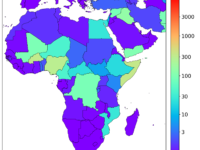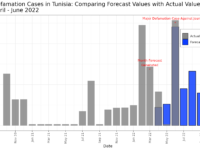The innovation addresses bullying in schools. How to report it and how to follow it. The innovation is a tool on how to report bullying quickly and react to it effectively. Also on how to follow up and analyze data regarding bullying. The innovation lies in the use of existing tools within Google Workspace for Education and on how to use digital tools to identify and react to bullying. Many schools use Google Workspace for Education, so the innovation does not require any further investment.
Innovation Tag: Data
The Ukraine war established a commitment to work across sectors to improve digital services to refugees. Focus on end user needs and an unbureaucratic organizational model have produced tangible results such as:
Better update of address information in national register
Electronic identification - access to digital services
Twelve agencies worked with obstacles and bottlenecks in the refugee's user journey, with the objective of good transitions between services.
Mapo-gu created a “SOS One-Stop System” for safe bicycle path. Since there are few buildings or facilities on the bicycle path, it is difficult for users to determine their current location. The basic number plate which is installed on the bicycle path shows the path name and location number and also includes a QR image associated with the system. Through the system, people can quickly call for help in the event of an accident.
Discovery as a Service (DaaS) enables successful delivery of UK Policing Technology through standardised and outcome based discoveries to provide evidence and overcome inconsistency in project initiation. By employing user centric thinking, agile delivery, innovation, and multi-disciplinary teams, DaaS ensures new national technology initiatives provide beneficial capabilities to UK Law Enforcement so they safeguard the UK public. This service is the first of its kind in the Home Office.
Most Brazilian metropolises have a transport network operated by a private company which makes it difficult for transport authorities to have a bright view of the public transport functioning. TRANCITY is a public transport monitoring dashboard which integrates different sources of data, such as bus location, ticketing and cameras, providing real time and historical information that supports management, planning and the operation of public transport networks, with data driven evidence.
MedeINN arose from the need to innovate in the government sector, in a city that had been developing its innovation capabilities in all other sectors. For this reason, and under Innovative State premise, we seek to connect the Mayor's Office of Medellín´s challenges with entrepreneurs and researchers capacities. This has been achieved after a redesign of a Public Procurement for Innovation methodology, which enables Open Innovation in the government sector.
The Environment Agency has a responsibility to protect communities from flood and coastal risks. In the past, the agency has struggled to scale their public engagement and reach their diverse audiences, while also retaining a local relevance. Hello Lamp Post was brought on to provide an interactive, live 24/7 conversational channel to educate and inform the public on flood safety, in high-risk locations around the South West of England and Newcastle.
The Violence Early-Warning System (ViEWS) is a publicly available data-driven forecasting system at the frontier of research that generates monthly predictions of conflict fatalities up to 36 months ahead – throughout Africa and the Middle East. The project launched in 2017 to help policy-makers and practitioners plan anticipatory action and humanitarian interventions with a transparent and evidence-based approach. It is based at Uppsala University and Peace Research Institute Oslo.
The hard-fought gains of democratization have come under attack in many countries. To reverse this trend, policymakers and civil society need new tools to navigate sophisticated forms of democratic erosion. We combine recent advances in machine learning with massive webscraping to produce high-frequency data and forecasts predicting where democratic backsliding will occur and the specific forms it will take. We equip pro-democracy forces with advanced warning to guide more strategic responses.
The rate of innovation often exceeds the speed at which regulatory systems can adapt, blurring lines between sectors and cutting across transitional regulatory and geographical boundaries. The RPF aims to keep the UK at the forefront of regulatory thinking and experimentation. It sponsors projects, led by regulators, aiming to help create a UK regulatory environment that encourages business innovation and investment. It is market-led and uses real-world innovation settings to deliver.





